| Srl | Item |
| 1 |
ID:
109175
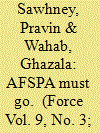

|
|
|
| 2 |
ID:
110141
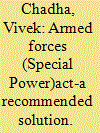

|
|
|
| 3 |
ID:
141777
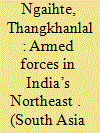

|
|
|
|
|
| Summary/Abstract |
More than 60 years of de facto military rule through the Armed Forces (Special Powers) Act (AFSPA) 1958 in India’s northeast has engendered neither stability nor peace. Problems regarding the impunity of violence and crime, official corruption and the virtual collapse of the rule of law continue, but the Act remains in operation. This article attempts to reframe the debates on the AFSPA in terms of its necessity by turning the necessity argument on its head and arguing that the secessionist insurgencies which were originally used to justify the Act have actually long ceased to exist. Since the principle of existential necessity that provided a fig leaf to the Act no longer applies, its continued application needs to be re-examined. It is further argued that the Indian military’s increasing clout in internal security policy-making may have grave implications for Indian democracy itself, with negative impacts on the rule of law and in relation to safe inclusion strategies for India’s northeast.
|
|
|
|
|
|
|
|
|
|
|
|
|
|
|
|
| 4 |
ID:
111051
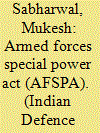

|
|
|
| 5 |
ID:
100225
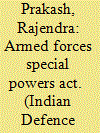

|
|
|
| 6 |
ID:
118461
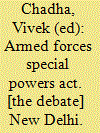

|
|
|
|
|
| Publication |
New Delhi, IDSA, 2013.
|
| Description |
viii,127p.pbk
|
| Standard Number |
8170951291
|
|
|
|
|
|
|
|
|
|
|
|
Copies: C:2/I:0,R:0,Q:0
Circulation
| Accession# | Call# | Current Location | Status | Policy | Location |
| 057086 | 343.0154/CHA 057086 | Main | On Shelf | General | |
| 057087 | 343.0154/CHA 057087 | Main | On Shelf | General | |
|
|
|
|
| 7 |
ID:
122443
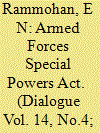

|
|
|
|
|
| Publication |
2013.
|
| Summary/Abstract |
On the 11
th
of July 2004, the personnel of the Assam Rifles picked up a
young woman from her house in Thoubal district at about 2300 hours.
Her house was searched but nothing was found. The Assam Rifles
personnel then arrested her and left after leaving an arrest memo stating
that they had not found anything incriminating. The next morning her
body was found on a nearby hillock with several bullet injuries around
her waist and abdomen. The local people who found her body naturally
thought that she had been raped. This was followed by the extraordinary
spectacle of a group of middle aged and elderly women leading a
march to the gate of the Assam Rifles and disrobing themselves
demanding that they should be raped. The valley then exploded in a
violent agitation that lasted more than a month. Regrettably the reaction
from the Centre was most unsympathetic. The statements made by
some senior officials were particularly insensitive. One stated that the
lady, Thangjom Manorama was a PLA cadre and she was an explosives
expert and several security personnel had been hurt and killed by her
explosive devices. This seemed to imply that her killing was justified.
|
|
|
|
|
|
|
|
|
|
|
|
|
|
|
|
| 8 |
ID:
122040
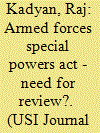

|
|
|
| 9 |
ID:
141025
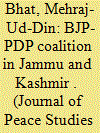

|
|
|
| 10 |
ID:
105984
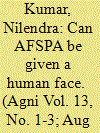

|
|
|
| 11 |
ID:
122562
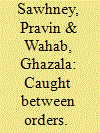

|
|
|
| 12 |
ID:
104522
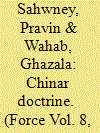

|
|
|
| 13 |
ID:
126737
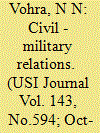

|
|
|
| 14 |
ID:
129999
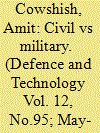

|
|
|
| 15 |
ID:
109183


|
|
|
| 16 |
ID:
118479
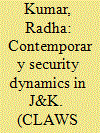

|
|
|
| 17 |
ID:
142321
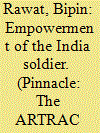

|
|
|
| 18 |
ID:
100386
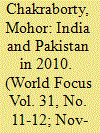

|
|
|
| 19 |
ID:
140443


|
|
|
|
|
| Publication |
Jaipur, Pointer publishers, 2012.
|
| Description |
xvii, 326p.hbk
|
| Standard Number |
9788171327287
|
|
|
|
|
|
|
|
|
|
|
|
Copies: C:1/I:0,R:0,Q:0
Circulation
| Accession# | Call# | Current Location | Status | Policy | Location |
| 058282 | 352.350954/AST 058282 | Main | On Shelf | General | |
|
|
|
|
| 20 |
ID:
150819


|
|
|
|
|
| Summary/Abstract |
India’s internal security commitment in the North East is well
over the half-century-long mark. In J&K, it has gone beyond a
quarter of a century. In both cases, it can reasonably be argued
that there have been periods of quietude in which the peace
process could have been progressed to see a viable termination
of respective insurgencies. In neither case has this apparently
been possible. A consequence of political inattention to conflict
resolution has been a continuing deployment of the army under
an unpopular law, the Armed Forces (Special Powers) Acts
(AFSPA). It can be inferred that the belief underlying the status
quo is that the army can indefinitely sustain such deployment
and its effects.
Successive army chiefs have, usually while demitting office,
pointed out that this is an unsustainable belief. Internal security
duties have a long-term and deleterious effect on the army and,
therefore, they have urged political engagement in restoring
normalcy. However, the situation has remained largely unchanged.
There is even a danger of the army itself buying into the belief
that its deployment is indispensable to national integrity. An
argument could go that though there was some respite from
2004 onward in Kashmir, its disruption in 2008–2010 and more
recently this year, suggests that army deployment is inescapable.
Not all effects of such deployment are harmful, and those that
are can be mitigated by requisite leadership and training. The
army has sufficient depth in terms of numbers and moral resilience
to be able to sustain such deployment indefinitely – or so an
argument can go.
ALI AHMED
62 January 2017. Volume 20. Number 74. AAKROSH
This article argues that the assumption of the army’s ability
to sustain army deployment in a counter-insurgency role in
numerous states is fallacious. The army has to push back on the
internal argument that this is possible and to push on with
persuading the political leadership that democratic solutions
politically arrived at are the answer to the disaffection of people.
A lack of energy in a narrative along these lines is a pointer
that winning the argument for this internally will be probably
as difficult as selling it to the political class. The danger is in
the counter argument – of the army’s indispensability in militarily
propping up national integrity – making the army acquire a
stake in the disrupted security situation. It should not be that
institutional interests keep the army from a strong case arguing
for its return to barracks, where such distancing from an internal
security situation warrants it.
|
|
|
|
|
|
|
|
|
|
|
|
|
|
|
|